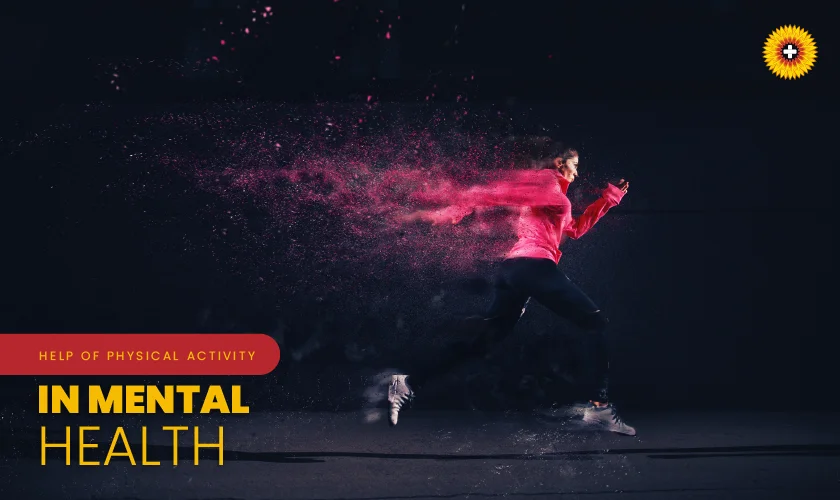Physical activity is crucial to maintaining a healthy lifestyle. We all know that exercise helps improve physical health, but did you know it also significantly impacts mental health? Regular physical activity can help reduce stress, anxiety, and depression while improving mood, self-esteem, and overall mental well-being. In this blog post, we will explore how physical activity helps with mental health, its health benefits, and its positive impact on mental and physical health.
The Connection Between Physical Activity and Mental Health
It’s no secret that regular physical activity helps improve physical health. However, many must know the powerful connection between physical activity and mental health. Research has shown that physical activity can reduce stress and anxiety, improve mood and cognitive function, and enhance overall mental well-being.
According to the Centers for Disease Control and Prevention (CDC), physical activity can help reduce symptoms of depression and anxiety, improve brain health, and increase well-being. Physical activity is also associated with improved cognitive function and can help prevent age-related cognitive decline.
How Does Physical Activity Help with Mental Health?
There are several ways in which physical activity can help improve mental health. Let’s take a closer look at some of how fitness works to benefit our mental state.
1. Reduces Stress and Anxiety Levels
Exercise is one of the most effective ways to reduce stress and anxiety. When you exercise, your body releases endorphins, which help reduce stress and anxiety levels. Endorphins are often called “feel-good” chemicals because they help improve mood and increase happiness and well-being.
In addition to endorphins, physical activity also helps reduce the levels of the stress hormone cortisol in the body. Cortisol is a hormone released in response to stress, and high cortisol levels can lead to negative health consequences, including increased anxiety and depression.
2. Boosts Mood and Self-Esteem
Physical activity is also associated with improved mood and self-esteem. When you exercise, your body releases neurotransmitters such as serotonin, dopamine, and norepinephrine, which are all linked to improved mood and happiness.
Physical activity also helps boost self-esteem. Regular exercise can help improve body image and self-perception, increasing self-confidence and self-esteem.
3. Improves Cognitive Function
Physical activity is also linked to improved cognitive function, including dementia. Exercise helps improve blood flow and oxygenation to the brain, which can help improve memory, concentration, and overall cognitive function.
Regular physical activity has also been shown to help prevent age-related cognitive decline. Our brains naturally decline in function as we age, but regular exercise can help slow down this decline and keep the brain healthy and functioning properly.
4. Builds Stronger Resilience
Physical activity has been shown to improve resilience by adapting and coping with stress and adversity. Regular exercise can help people build the physical and mental strength needed to handle challenges and setbacks in life.
5. Promotes Better Sleep
Sleep is essential for overall health and well-being, and physical activity can help improve sleep quality. Exercise can help regulate the sleep-wake cycle, promote relaxation, and reduce insomnia symptoms. By getting better sleep, individuals can feel more alert and focused during the day, improving their mental state.
6. More Energy
Physical activity can also help boost energy levels, reducing feelings of fatigue and lethargy. Exercise increases blood flow and oxygen delivery to the body, providing a natural energy boost. Regular physical activity can also improve endurance and stamina, allowing individuals to perform daily tasks more easily and with less effort.
Mind and Body Wellness: How Regular Exercise Can Boost Mental Health
Incorporating physical activity into your daily routine doesn’t have to be complicated or time-consuming. It can be as simple as walking during your lunch break or doing a quick workout at home
Whether through gym workouts, outdoor activities, or group fitness classes, find an exercise routine you enjoy and can stick to. If you don’t enjoy running, try swimming or cycling instead. If you don’t have time for a full workout, break it into shorter sessions throughout the day.
Just 30 minutes of moderate exercise five times a week is enough to reap exercise’s physical and mental health benefits. You can break it down into smaller sessions, such as two 15-minute or three 10-minute sessions.
Even small amounts of activity can make a difference. Starting with 5- or 10-minute exercise sessions is okay, and you can slowly increase the time as you feel more comfortable. Consistency is key; committing to moderate physical activity on most days can help you establish a healthy habit. Over time, you can add extra minutes or try different activities, and you’ll notice the benefits of exercise paying off, including increased energy and improved mental health.
The Positive Impact of Physical Activity on Overall Health
Regular physical activity has a powerful impact on mental and physical health, reducing stress and anxiety, improving mood and cognitive function, and enhancing overall well-being. It also improves cardiovascular health and physical fitness and lowers the risk of chronic diseases. Prioritizing mental and physical health is key to achieving optimal results in total performance.
Furthermore, physical activity can be a great way to connect with others and build social connections. Whether it’s joining a sports team, participating in a fitness class, or simply walking with friends, physical activity can be a fun and social way to improve overall well-being.
The Bottom Line
Exercise your way to better mental health. Regular physical activity can positively impact our total performance, making us more productive and efficient daily.
Consider incorporating regular physical activity into your routine to improve your mental health. Visit Urgent Care of Kansas to learn more about our services and take the first step towards a healthier, happier you.



No comment